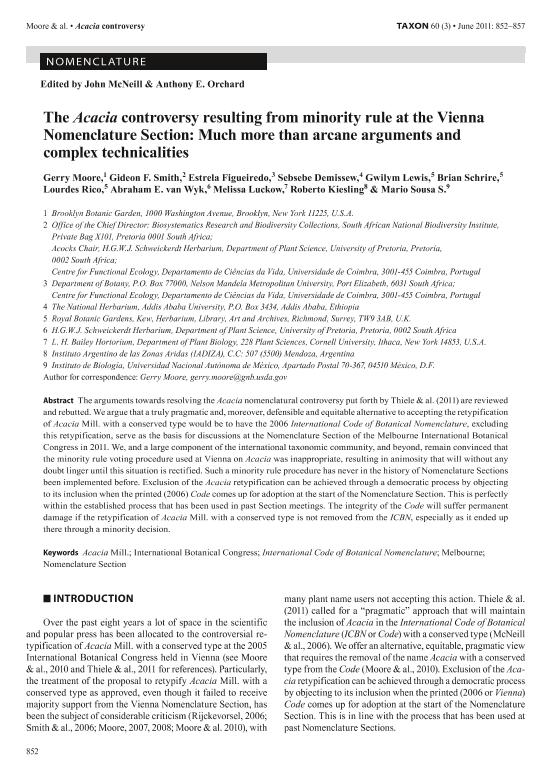Mostrar el registro sencillo del ítem
dc.contributor.author
Moore, Gerry
dc.contributor.author
Smith, Gideon F.
dc.contributor.author
Figueiredo, Estrela
dc.contributor.author
Demissew, Sebsebe
dc.contributor.author
Lewis, Gwilym
dc.contributor.author
Schrire, Brian
dc.contributor.author
Rico, Lourdes
dc.contributor.author
van Wyk, Abraham E.
dc.contributor.author
Luckow, Melissa
dc.contributor.author
Kiesling, Roberto

dc.contributor.author
Sousa S., Mario
dc.date.available
2019-12-27T17:48:13Z
dc.date.issued
2011-06
dc.identifier.citation
Moore, Gerry; Smith, Gideon F.; Figueiredo, Estrela; Demissew, Sebsebe; Lewis, Gwilym; et al.; The Acacia controversy resulting from minority rule at the Vienna Nomenclature Section: Much more than arcane arguments and complex technicalities; Wiley; Taxon; 60; 3; 6-2011; 852-857
dc.identifier.issn
0040-0262
dc.identifier.uri
http://hdl.handle.net/11336/93111
dc.description.abstract
The arguments towards resolving the Acacia nomenclatural controversy put forth by Thiele & al. (2011) are reviewed and rebutted. We argue that a truly pragmatic and, moreover, defensible and equitable alternative to accepting the retypification of Acacia Mill. with a conserved type would be to have the 2006 International Code of Botanical Nomenclature, excluding this retypification, serve as the basis for discussions at the Nomenclature Section of the Melbourne International Botanical Congress in 2011. We, and a large component of the international taxonomic community, and beyond, remain convinced that the minority rule voting procedure used at Vienna on Acacia was inappropriate, resulting in animosity that will without any doubt linger until this situation is rectified. Such a minority rule procedure has never in the history of Nomenclature Sections been implemented before. Exclusion of the Acacia retypification can be achieved through a democratic process by objecting to its inclusion when the printed (2006) Code comes up for adoption at the start of the Nomenclature Section. This is perfectly within the established process that has been used in past Section meetings. The integrity of the Code will suffer permanent damage if the retypification of Acacia Mill. with a conserved type is not removed from the ICBN, especially as it ended up there through a minority decision.The arguments towards resolving the Acacia nomenclatural controversy put forth by Thiele & al. (2011) are reviewed and rebutted. We argue that a truly pragmatic and, moreover, defensible and equitable alternative to accepting the retypification of Acacia Mill. with a conserved type would be to have the 2006 International Code of Botanical Nomenclature, excluding this retypification, serve as the basis for discussions at the Nomenclature Section of the Melbourne International Botanical Congress in 2011. We, and a large component of the international taxonomic community, and beyond, remain convinced that the minority rule voting procedure used at Vienna on Acacia was inappropriate, resulting in animosity that will without any doubt linger until this situation is rectified. Such a minority rule procedure has never in the history of Nomenclature Sections been implemented before. Exclusion of the Acacia retypification can be achieved through a democratic process by objecting to its inclusion when the printed (2006) Code comes up for adoption at the start of the Nomenclature Section. This is perfectly within the established process that has been used in past Section meetings. The integrity of the Code will suffer permanent damage if the retypification of Acacia Mill. with a conserved type is not removed from the ICBN, especially as it ended up there through a minority decision.
dc.format
application/pdf
dc.language.iso
eng
dc.publisher
Wiley

dc.rights
info:eu-repo/semantics/openAccess
dc.rights.uri
https://creativecommons.org/licenses/by-nc-sa/2.5/ar/
dc.subject
Acacia Mill.
dc.subject
International Botanical Congress
dc.subject
International Code of Botanical Nomenclature
dc.subject
Melbourne
dc.subject.classification
Ciencias de las Plantas, Botánica

dc.subject.classification
Ciencias Biológicas

dc.subject.classification
CIENCIAS NATURALES Y EXACTAS

dc.title
The Acacia controversy resulting from minority rule at the Vienna Nomenclature Section: Much more than arcane arguments and complex technicalities
dc.type
info:eu-repo/semantics/article
dc.type
info:ar-repo/semantics/artículo
dc.type
info:eu-repo/semantics/publishedVersion
dc.date.updated
2019-08-27T18:34:36Z
dc.journal.volume
60
dc.journal.number
3
dc.journal.pagination
852-857
dc.journal.pais
Austria

dc.journal.ciudad
Viena
dc.description.fil
Fil: Moore, Gerry. Brooklin Botanical Gardens; Estados Unidos
dc.description.fil
Fil: Smith, Gideon F.. South African National Biodiversity Institute; Sudáfrica
dc.description.fil
Fil: Figereido, Estrela. Universidad de Coimbra; Portugal
dc.description.fil
Fil: Demissew, Sebsebe. Addis Ababa University; Etiopía
dc.description.fil
Fil: Lewis, Gwilym. Royal Botanic Gardens; Reino Unido
dc.description.fil
Fil: Schrire, Brian. Royal Botanic Gardens; Reino Unido
dc.description.fil
Fil: Rico, Lourdes. Royal Botanic Gardens; Reino Unido
dc.description.fil
Fil: Wik, Abraham E. von. University Of Pretoria, Dept. Plant Science; Sudáfrica
dc.description.fil
Fil: Melissa Luckow. Cornell University; Estados Unidos
dc.description.fil
Fil: Kiesling, Roberto. Consejo Nacional de Investigaciones Científicas y Técnicas. Centro Científico Tecnológico Conicet - Mendoza. Instituto Argentino de Investigaciones de las Zonas Áridas. Provincia de Mendoza. Instituto Argentino de Investigaciones de las Zonas Áridas. Universidad Nacional de Cuyo. Instituto Argentino de Investigaciones de las Zonas Áridas; Argentina
dc.description.fil
Fil: Souza, Mario. Universidad Autónoma de México, Ito, de Biología; México
dc.journal.title
Taxon

dc.relation.alternativeid
info:eu-repo/semantics/altIdentifier/url/https://onlinelibrary.wiley.com/doi/10.1002/tax.603017
dc.relation.alternativeid
info:eu-repo/semantics/altIdentifier/doi/http://dx.doi.org/10.1002/tax.603017
Archivos asociados
